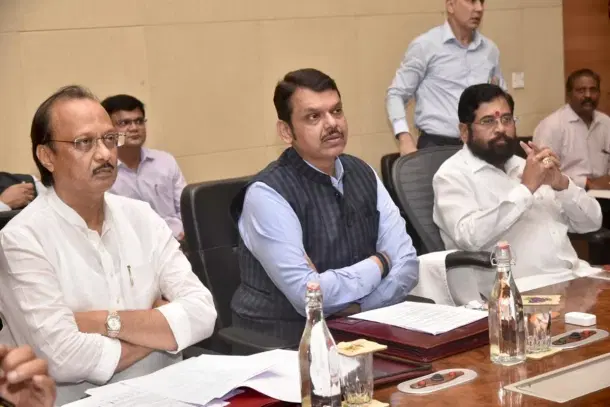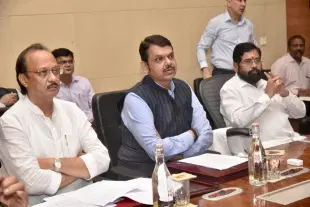Politics
Maharashtra: Mahayuti's Unforced Error Count Going Up Even Before Election Announcement
Swarajya Staff
Aug 16, 2024, 10:11 AM | Updated 11:37 AM IST
Save & read from anywhere!
Bookmark stories for easy access on any device or the Swarajya app.


A popular English saying goes – Once is a mistake, twice is a choice, thrice is a habit. However, in the case of the ruling coalition government in Maharashtra – the Mahayuti, there will not be a third occasion if it fails to get its act right in the present.
The coalition led by Deputy Chief Minister Devendra Fadnavis of the Bharatiya Janata Party (BJP), Chief Minister Eknath Shinde led Shiv Sena and the Deputy Chief Minister Ajit Pawar’s Nationalist Congress Party (NCP), seems to have failed in taking a lesson from it’s poor show in the recently held 2024 Lok Sabha polls.
In these elections, Mahayuti’s seat share in Maharashtra (which comprises 48 Lok Sabha constituencies, the second highest state-wise after Uttar Pradesh), dropped from 43 seats won in 2019 to 17 at the present.
The biggest blow was taken by the BJP, which has been steering the coalition, with its seat share dropping sharply from 23 to nine.
A combination of several factors ranging from the coalition leader’s inability to pacify the Maratha Reservation agitation, inadequate advertising of centre’s welfare schemes implemented in the state, severe anti-incumbency in several constituencies against the candidates to rural issues related to onion export culminated in Mahayuti receiving a sound drubbing in the polls.
In an ideal case, it is expected from any political party (or a coalition in this case), that before the next major elections ahead, the leaders should introspect and all elected representatives resolve not to repeat the previous blunders.
Contrary to this notion, with only a month and a half left for the state assembly polls, Members of Legislative Assembly (MLA) from all three constituent parties of Mahayuti are displaying a reluctance to learn from previous mistakes.
1) Ladki Bahin’s Troubles
While BJP’s seat share in Uttar Pradesh and Maharashtra declined in the 2024 Lok Sabha polls, the saffron party’s candidates won all 28 Lok Sabha seats in Madhya Pradesh. Among the many reasons cited for this success was the Mukhyamantri Ladli Behna Yojana launched by the BJP government in Madhya Pradesh under which all women from below poverty line (BPL) families are entitled to a monthly handout of Rs 1,500.
Maharashtra’s CM and Mahayuti leader Eknath Shinde is said to have suggested that maybe implementing a similar scheme in Maharashtra would help the coalition to turn around its fortunes. Accordingly the state government announced the Mukhyamantri Ladki Bahin Yojana along with a slew of other poll sops and handouts in its last budget.
However, even before the first instalment of Rs 1,500 is released, the scheme has run into several troubles ranging from threats to corruption.
In a major embarrassment to the coalition’s top leaders, at least two Mahayuti MLAs have threatened women that if they don’t vote for the coalition candidates, they will lose the monthly dole.
In the first case, independent MLA Ravi Rana who is part of the coalition, said that he will snatch the money from the women beneficiaries if they didn’t vote him back. This hasn’t gone down well with the masses who reacted saying that these ruling party MLAs are behaving as if the amount will be given from their pockets.
This was followed by a similar statement by CM Shinde led Sena’s MLA Mahesh Shinde. In this case, the Sena MLA resorted to fear mongering saying that if the coalition is not voted back to power, the scrutinising committee appointed by the new government might weed out a large number of beneficiaries.
If the inability to control motormouths in the coalition wasn’t enough of a headache for the Mahayuti’s top brass, several reports have emerged of state government officials ranging from clerks to Talathis to private Setu Kendra operators offering Aadhaar Card update facility, seeking bribes in the range of Rs 50 to Rs 2,000.
This is despite CM Shinde’s warning to the officials to ensure none of the women applicants are harassed.
2) Onion Tears
Mahayuti’s base was seen to have eroded in the recent Lok Sabha polls across the regions of the state. However, its losses in the Western Maharashtra is majorly said to have been due to the BJP-led Union Government’s contentious policy regarding onion exports.
Nashik, Pune, Satara and Ahmednagar districts see production of the red onion in large quantities. In fact, the Agricultural Produce Marketing Committee Market at Lasalgaon near Nashik is touted to be the largest onion market in Asia.
Considering the past experience of rise in onion prices having dented its electoral fortunes, the Union government had banned onion export in December 2023 only to allow it in limited quantities a few days after the Phase 1 Lok Sabha polling.
Such market intervention along with the 40 percent export duty levied in the years before did not go down well with the voters in these onion growing regions causing Mahayuti to lose the Lok Sabha seats of Nashik, Dindori, Shirur, Baramati and Ahmednagar.
Instead of taking a lesson from this setback, the state government has now cancelled the subsidy given to onion farmers for erecting onion storage sheds. This was instantly highlighted by the regional media and has enraged the onion farmers even more.
This is apart from the logic of curbing exports to control domestic prices being questioned since onion prices in the retail market continue to be relatively high with 1 kilogram of onion being sold in Pune at Rs 40.
3) Getting The Social Math Wrong
Mahayuti suffered during the Lok Sabha elections because of the Maha Vikas Aghadi (coalition of the opposition parties) narrative that BJP was anti-reservation and would change the constitution if voted back into power. The coalition lost a considerable amount of Scheduled Caste and Scheduled Tribe votes due to this fear mongering.
Instead of taking corrective measures to mend the broken ties with the marginalised groups, Mahayuti has reportedly planned to divert funds from the Social Welfare Department (meant for SCs) to be used for the Mukhyamantri Teerth Darshan Yojana which entails a dole of Rs 30,000 to senior citizens hailing from BPL families. This has not gone down well with the SCs, especially with the large number of Ambedkarite Neo-Buddhists who constitute nearly 8 percent of the population.
This apart, Mahayuti has also failed in pacifying the other major social group – the Marathas, which turned away from it in the recent polls.
The state government gave 10 percent reservation to Marathas under the Socially and Educationally Backward Class (SEBC) category exclusively created for the dominant caste in January 2024. At the same time, it decided to exclude the community from availing the 10 percent quota meant for Economically Weaker Sections (EWS).
Marathas, who constitute nearly 30 percent of the state’s population, are not happy with this move because SEBC reservation has been discarded twice in the past by the Supreme Court.
This is also the reason why the community's agitator-in-chief Manoj Jarange has been consistently asking for blanket inclusion of Marathas in the Other Backward Classes (OBC) category. As per him, Kunbis who are part of the OBC list are part of the same social grouping as that of Marathas and thus all Marathas are eligible for OBC certificates.
Moreover, prior to exclusion of Marathas from the EWS and promulgation of the SEBC quota, candidates from the Maratha community dominated the former.
However, with their exclusion now, a large number of Muslim candidates are benefiting from the EWS quota in the recruitment drive being carried out by the state government and in admissions for higher education.
Screenshots of Muslims dominating the EWS list in the recent selections made for police recruitment and other state government jobs have been circulating across social media.
This has now led to Mahayuti facing a double whammy.
On one hand, the Maratha community youth are angry for being excluded from the EWS category and being awarded the separate SEBC quota which they were not keen to have owing to its susceptibility to be cancelled by the courts.
On the other hand, candidates from minority communities dominating EWS lists has also angered BJP’s loyal forward caste voters. Among them, youth from the Brahmin, Marwadi, Jain and other mercantile castes like Komtis and Banijiga Lingayats are particularly displeased as a large chunk of them do not benefit from the EWS quota due to salaried income also being considered in the Rs 8 lakh annual income limit, which is not the case for those who wish to avail OBC reservation in Maharashtra.





